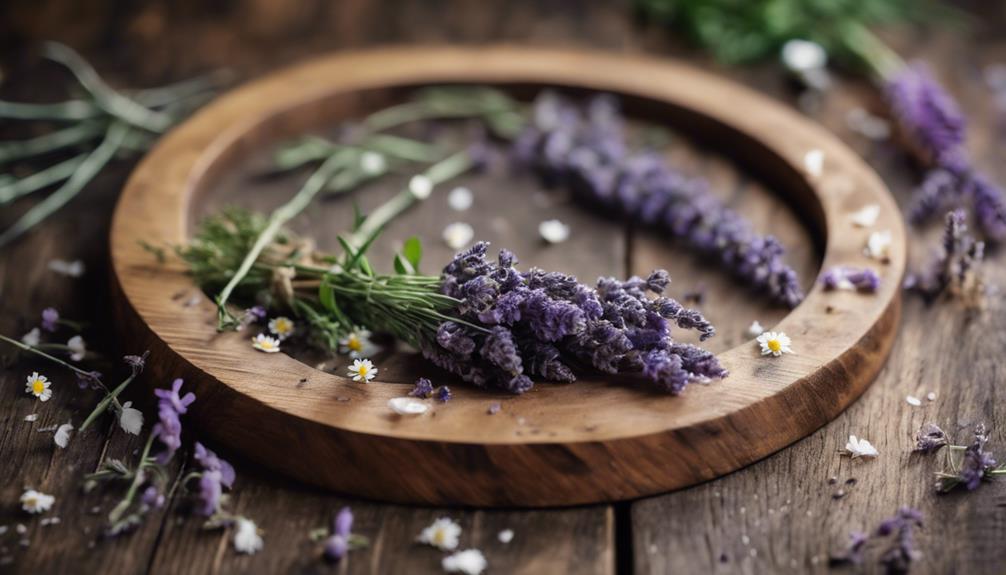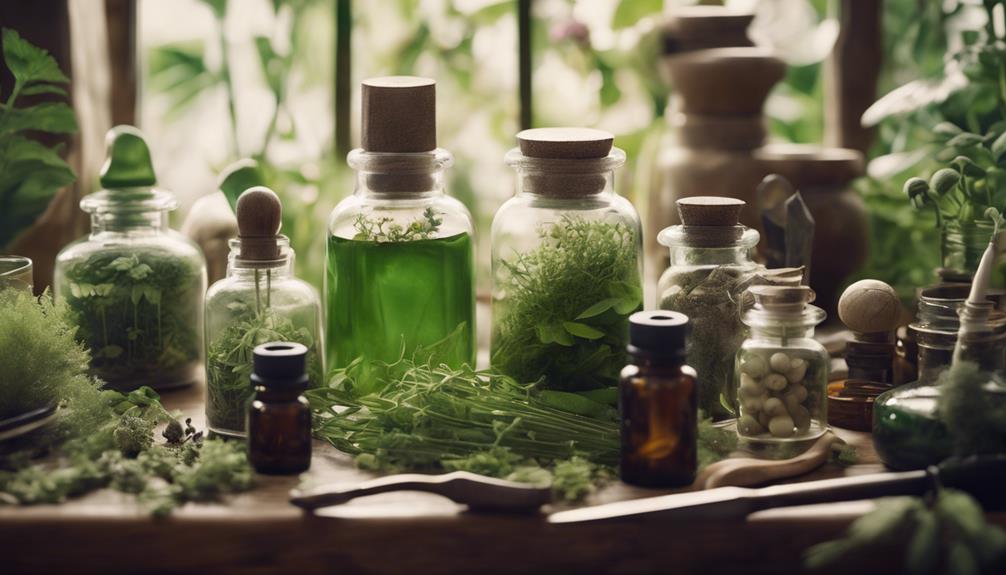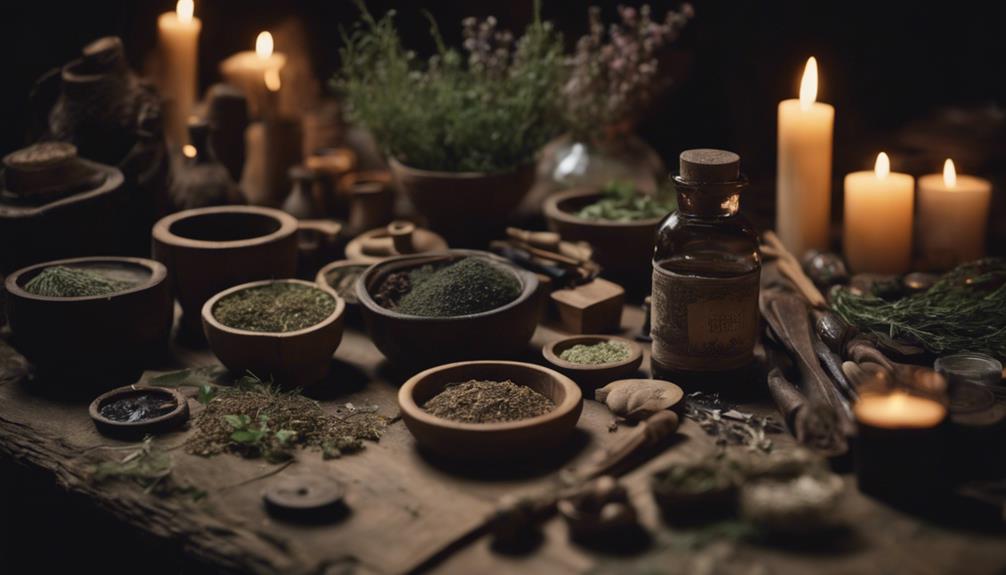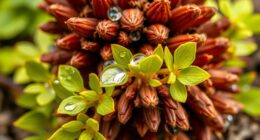We've relied on herbs for wellness, and 10 popular botanicals stand out in herbalism. Peppermint relieves digestive issues, while chamomile calms nerves and promotes restful sleep. Ginger alleviates nausea and inflammation, and turmeric reduces pain and inflammation with its curcumin. Ginkgo biloba enhances cognitive function, and St. John's Wort helps with mild depression. Valerian root is a natural sedative, and marshmallow root soothes skin and hair. Dandelion root supports liver and kidney health, and echinacea boosts immunity. As we explore these herbs, we'll uncover more about their unique properties and how they can promote overall well-being.
Key Takeaways
• Peppermint is used to relieve bloating, indigestion, and gas, and also aids in muscle relaxation and digestive health.
• Chamomile is consumed as tea or essential oil to calm nerves, reduce anxiety, and promote restful sleep.
• Ginger alleviates nausea, vomiting, and inflammation, making it helpful for morning sickness and chemotherapy-induced nausea.
• Turmeric contains curcumin, which relieves pain and inflammation, making it beneficial for arthritis and other conditions.
• Echinacea is an immune-boosting herb that reduces the risk of colds and flu, and shortens the duration of symptoms.
Peppermint for Digestive Relief
We've all experienced the discomfort of bloating and indigestion at some point, which is why peppermint has become a popular herb in herbalism for its digestive benefits. As an herb, peppermint has been shown to provide significant digestive relief, alleviating symptoms like bloating and indigestion.
The active compound in peppermint, menthol, has a relaxing effect on the muscles of the digestive tract, easing discomfort. One of the most common ways to consume peppermint for digestive relief is through peppermint tea, which promotes better digestion and reduces gas.
Studies have also shown that peppermint oil capsules can help alleviate symptoms of irritable bowel syndrome (IBS) like abdominal pain and discomfort. Additionally, peppermint's anti-inflammatory properties make it a natural remedy for soothing gastrointestinal issues and promoting overall digestive health.
Chamomile for Anxiety and Sleep

As we navigate the challenges of modern life, chamomile's calming effects have made it a trusted ally in our quest for anxiety relief and better sleep. In the domain of herbalism, chamomile is a popular herb renowned for its ability to soothe frayed nerves and promote restful sleep.
Studies have shown that chamomile can greatly reduce symptoms of generalized anxiety disorder and improve overall sleep patterns. The herb's calming properties can be attributed to compounds like apigenin, which interact with receptors in the brain to induce relaxation and reduce stress.
We can reap the benefits of chamomile by consuming it as a tea or using it in essential oil form for aromatherapy benefits. Unlike harsh pharmaceuticals, chamomile's mild sedative properties make it a natural and gentle option for managing anxiety and promoting restful sleep.
Ginger for Nausea and Inflammation
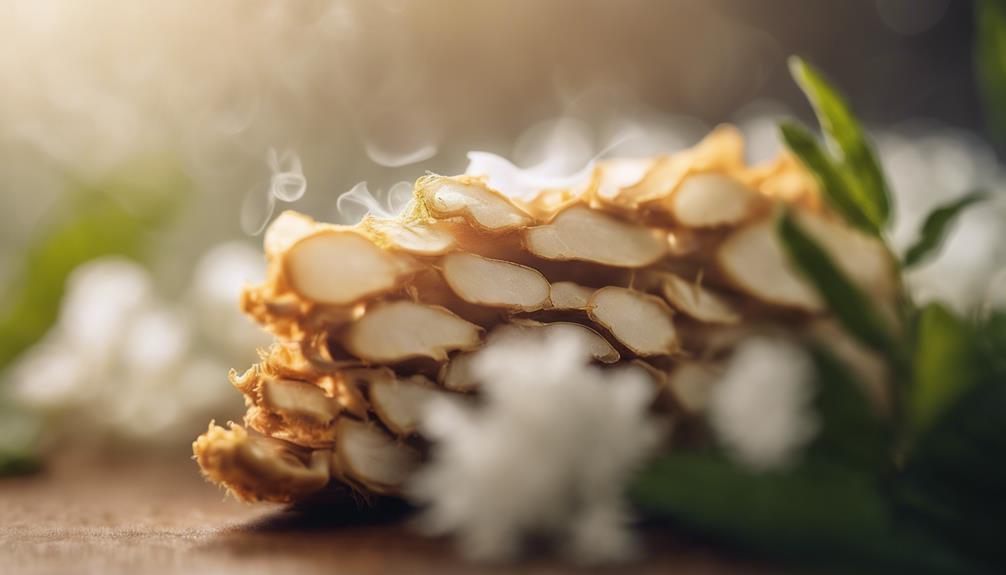
Ginger's potent anti-inflammatory properties make it a trusted natural remedy for alleviating nausea and inflammation, providing relief from discomfort and promoting overall well-being. As a traditional herbal medicine, ginger has been used for centuries to combat nausea and digestive issues.
We've found that ginger's bioactive compounds, gingerols and shogaols, are responsible for its anti-inflammatory effects, making it a valuable asset in herbalism.
Some of the ways we can benefit from ginger include:
- Reducing nausea and vomiting, making it an excellent natural remedy for morning sickness during pregnancy or chemotherapy-induced nausea
- Inhibiting inflammation, which may help alleviate symptoms of osteoarthritis and other inflammatory conditions
- Aiding digestion and reducing discomfort, making it a staple in traditional medicine for centuries
Turmeric for Pain and Inflammation

While ginger has been a trusted ally in combating nausea and inflammation, turmeric has emerged as a potent natural remedy for alleviating pain and inflammation, thanks to its powerful active compound, curcumin.
As we explore the field of herbal medicine, we find turmeric to be a shining star, particularly in reducing pain and inflammation in conditions like arthritis. For centuries, turmeric has been a cornerstone of Ayurvedic medicine, treating a variety of ailments.
The anti-inflammatory properties of curcumin have sparked significant research, uncovering its potential therapeutic benefits in various health conditions. By incorporating turmeric into our diet or taking supplements, we may be able to manage pain and inflammation naturally.
When delving deeper into the world of herbalism, it's crucial to understand the science backing turmeric's benefits. With its rich history in traditional medicine and mounting scientific evidence, turmeric is an herb worth exploring for those seeking a natural approach to pain management. By doing so, we can harness the power of turmeric to improve our overall well-being.
Ginkgo Biloba for Brain Function

We've long been fascinated by the potential of ginkgo biloba to access the full potential of our minds, and it's no wonder why this ancient herb has been a staple in traditional medicine for centuries.
As we explore the benefits of ginkgo biloba, it's evident that this herb is a powerhouse for brain health. Here are just a few ways ginkgo biloba can support our cognitive function:
- Improves memory and cognitive function: Ginkgo biloba has been shown to enhance memory, particularly in individuals with Alzheimer's disease.
- Enhances blood circulation: The antioxidants in ginkgo biloba help protect against cell damage and improve blood circulation, which may benefit brain health.
- May slow age-related decline: Research suggests that ginkgo biloba may help slow down age-related cognitive decline and reduce the risk of dementia.
As we explore the potential of ginkgo biloba, it's important to remember to consult with a healthcare provider before using this herb, especially if taking medications or having underlying health conditions. By doing so, we can tap into the full potential of ginkgo biloba and support our overall brain health.
Echinacea for Immune System

As we shift our focus to immune system support, we turn to echinacea, a herbal powerhouse renowned for its ability to fortify our defenses against illness. This herb is particularly celebrated for its immune-boosting properties, which have been shown to reduce the risk of developing colds by a remarkable 58%.
When we do fall ill, echinacea can help shorten the duration of colds and flu symptoms, making it an invaluable addition to our natural health arsenal. Fortunately, echinacea is available in various forms, including teas, capsules, and extracts, making it easy to incorporate into our daily routine.
While generally well-tolerated, we should be aware that echinacea may cause allergic reactions in some individuals. By understanding the benefits and potential drawbacks of echinacea, we can harness its power to support our immune system and maintain peak health.
St. John's Wort for Mood Enhancement

In our quest for natural mood enhancers, we turn to St. John's Wort, a revered herb that has been shown to alleviate mild to moderate depression and anxiety. This herb has been extensively studied, with results suggesting it may be as effective as standard antidepressants in alleviating depressive symptoms.
But what makes St. John's Wort so effective?
- St. John's Wort contains active compounds, hypericin and hyperforin, which influence neurotransmitters in the brain.
- It's available in various forms, including capsules, tablets, teas, and liquid extracts, making it easy to incorporate into our daily routine.
- Studies have shown that St. John's Wort can be a safe and effective treatment for mild to moderate depression, with fewer side effects compared to traditional antidepressants.
It's essential to consult with a healthcare provider before using St. John's Wort, as it can interact with certain medications and may not be suitable for everyone. However, for those who can use it, St. John's Wort offers a natural and effective solution for mood enhancement.
Valerian Root for Insomnia and Relaxation

Valerian root, a natural sedative, has been used for centuries to calm restless minds and bodies, allowing us to slip into a peaceful slumber.
As an herbal remedy, valerian root has been a popular choice for treating insomnia and promoting relaxation. Studies have shown that it may improve sleep quality and reduce the time it takes to fall asleep, making it an attractive alternative to prescription sleep medications.
We can easily incorporate valerian root into our daily routine, as it's available in various forms such as capsules, teas, and tinctures. The sedative properties of valerian root are attributed to compounds like valerenic acid and valerone, which work together to calm our minds and bodies.
For those struggling with sleep disorders, valerian root offers a safe and natural solution. By choosing valerian root, we can avoid the potential side effects of prescription medications and instead opt for a gentle, herbal approach to relaxation and restful sleep.
Marshmallow Root for Skin and Hair

With its rich history in herbalism, marshmallow root has become a trusted ally for soothing and nourishing our skin and hair, offering a natural solution for common beauty concerns.
As we explore the benefits of marshmallow root, we're excited to investigate its skin-soothing and moisturizing properties.
- Marshmallow root contains mucilage, a gel-like substance that helps hydrate and protect the skin, making it beneficial for dry, sensitive, or inflamed skin conditions.
- It's also used in hair care products for its detangling and conditioning effects, promoting smoother and more manageable hair.
- Research suggests that marshmallow root may have anti-inflammatory and antioxidant properties, further supporting its role in promoting healthy skin and hair.
We can harness the benefits of marshmallow root by brewing it into teas, infusing it in oils, or incorporating it into skincare formulations.
Whether we're dealing with dry skin, frizzy hair, or just looking for a natural way to pamper ourselves, marshmallow root is definitely worth considering. Its natural, gentle, and effective properties make it an excellent addition to our herbalism toolkit.
Dandelion Root for Liver and Kidney

We often turn to dandelion root, a humble yet powerful herb, to support our liver and kidney health, leveraging its natural diuretic properties to promote a balanced and thriving body. As herbalism practitioners, we appreciate the wealth of benefits this herb provides.
Rich in antioxidants and compounds that support liver detoxification and kidney function, dandelion root is a valuable addition to our herbal remedies. By reducing inflammation in the liver and promoting bile production, it helps us maintain healthy digestion. Additionally, its richness in vitamins and minerals makes it a nutritious supplement.
In traditional medicine, dandelion root has been used for centuries to support overall liver and kidney health. By incorporating it into our herbalism practices, we can promote a healthy balance between these vital organs and maintain overall well-being.
Frequently Asked Questions
What Herbs Are Used in Herbalism?
We're often asked what herbs are used in herbalism. Well, the answer is quite varied.
We find that herbalists use a range of herbs, including those commonly used in cooking, like rosemary and thyme, as well as others like ginseng, ginger, and chamomile.
Some herbs, like echinacea and turmeric, are prized for their medicinal properties, while others, like lavender and valerian, are used to promote relaxation.
What Are the 10 Most Used Herbs?
As we venture on this journey to uncover the most used herbs, we find ourselves standing at the crossroads of nature and wellness.
We ask ourselves, what're the top 10 herbs that have earned a permanent spot in the herbalist's apothecary?
The answer lies in the domain of Echinacea, Ginseng, Ginkgo, Garlic, and St. John's Wort, among a few others, each boasting unique benefits that have captured the hearts of herbal enthusiasts worldwide.
What Are the Most Common Medicinal Herbs?
We often wonder what the most common medicinal herbs are. From our research, we've found that Echinacea, Garlic, and Ginger top the list. These herbs have been widely used for centuries, and their health benefits are well-documented.
Additionally, Turmeric, Ginseng, and Peppermint are also commonly used for their medicinal properties. These herbs are often found in herbal supplements and traditional remedies, and their popularity endures due to their proven efficacy in promoting overall well-being.
What Is the Most Powerful Healing Herb?
It's clear to us that identifying a single most powerful healing herb can be misleading, as each herb's potency varies depending on the specific health condition being addressed.
While turmeric, ginger, and echinacea are commonly recognized for their healing properties, we acknowledge that the concept of a single 'most powerful' herb is subjective and context-dependent.
Conclusion
As we conclude our exploration of these 10 common herbs used in herbalism, we're reminded that nature's pharmacy has been serving humanity for centuries – even ancient Greeks used chamomile to calm their nerves!
Today, we can harness the power of these herbs to alleviate modern woes, from digestive issues to anxiety and insomnia.
By incorporating these natural remedies into our daily lives, we can take a step towards a healthier, more balanced us.

